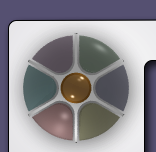|
|
 |
|
 |
 |
|
 |
|
Demo Scenarios
|
|
 |
|
 |
 |
Introduction
The first boot entry of the Demo-CD features a short introduction into the microkernel-based
system architecture as the basic concept shared by all demo scenarios.
Read introduction online
A Nitpicker's guide to a minimal-complexity secure GUI
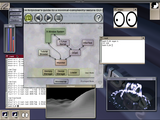
|
Nitpicker is a new low-complexity graphical user interface that is designed to execute security-sensitive applications and existing software side-by-side. This presentation will show off the features of Nitpicker and guide you through our software. On your way through the demo scenario, you will be acquainted with nice contemporaries such as Fiasco, Scout, DOpE, and L4Linux. You will see our approach of protecting you from the bad guys (e.g., Spyware) and enabling you to uncover Trojan Horses. Browse tutorial online
|
- Read the paper about Nitpicker
-
Norman Feske and Christian Helmuth:
"A Nitpicker's guide to a minimal-complexity secure GUI",
(In proceedings of the 21st Annual Computer Security Applications Conference (ACSAC 2005), Tucson, Arizona, USA, December 2005)
- Contact Norman Feske
-
Email: feske@os.inf.tu-dresden.de
Personal Website: http://os.inf.tu-dresden.de/~nf2
Qt for the L4 Environment
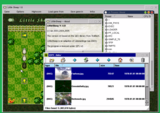
|
Qt is a widely-used cross-platform toolkit that is being developed by the Norwegian software company Trolltech. It allows software developers to create powerful applications that can run on any platform supported by Qt. The toolkit is available for a variety of platforms, including Unix and Microsoft Windows. With Qt's source code being available under the terms of the GNU General Public License, we were able to port version 3.3 the Qt toolkit to the L4 platform. On this Demo CD, we will give you some background information on the port. And, of course, you will also have the chance to try Qt for L4 yourself in an interactive demo. Browse tutorial online
|
- Contact Carsten Weinhold
-
Email: cw183155@os.inf.tu-dresden.de
L4Linux - A virtualized Linux on a componentized, small kernel system
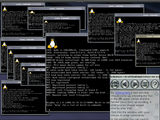
|
L4Linux is a port of the Linux kernel to L4 and makes it possible to run unmodified Linux programs on top of L4. In the L4Linux demo we will show how L4Linux integrates in an L4 system and point out several different usage scenarios in which L4Linux can be used. The actual demonstration focusses on launching multiple instances of L4Linux, until the system resources are exhausted. More deployments of L4Linux can be seen in the other demonstrations. Browse tutorial online
|
- Contact Adam Lackorzynski
-
Email: adam@os.inf.tu-dresden.de
DSweeper / DDE Kit - Drivers in Userspace
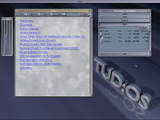
|
When creating a new operating system the need for device drivers arises. Developing new drivers from scratch takes much time and implicates high costs. We at the TU Dresden are adopting a different approach: We reuse drivers of commodity operating systems by encapsulating them in a device driver environment (DDE). The DDE provides all functionality the commodity OS offers its drivers. Beside the DDE we just need to implement a single adapter per device class (IDE devices, audio devices, ...) which makes the driver's services available on our operating system. In the DDE demo we present a short summary about our research regarding device drivers, and as an example we show DSweeper, a disk erasure utility which uses the FreeBSD IDE driver for disk access. Browse tutorial online
|
- Contact our driver developers Christian Helmuth and Thomas Friebel
-
Email: drivers@os.inf.tu-dresden.de
L4VFS - L4 virtual file system layer
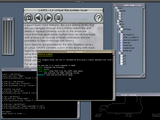
|
L4VFS is the IO infrastructure for a Posix-like multi-server system on top L4 and DROPS. It comprises a set of client-side libraries gluing together typical C library functions in the client and a service providing set of servers on the other side. In the demo we show how terminal IO works, demonstrate some VT100 escape sequence magic, GNU Readline Library support, and file system browsing. Browse tutorial online
|
- Contact Martin Pohlack
-
Email: pohlack@os.inf.tu-dresden.de
Personal Website: http://os.inf.tu-dresden.de/~mp26
- Contact Björn Döbel
-
Email: doebel@os.inf.tu-dresden.de
Trusted E-Commerce Transaction Client
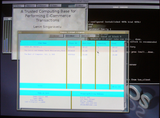
|
The large size and high complexity of current applications and systems software has resulted in security-sensitive applications with a large number of vulnerabilities. We present a solution that tackles the size and complexity aspect of security-sensitive software, by extracting security-sensitive portions of existing software in to smaller AppCores and TCBs. The Trusted E-Commerce Transaction client is one such application, that executes an e-commerce transaction protocol over SSL, complete with a parser and display, in under 10 KLOC. The client runs on top of an L4 microkernel based TCB, which contains around 100 KLOC. This is an order of magnitude smaller than a Linux based system (~1.5 MLOC - kernel + XServer). Browse tutorial online
|
- Contact Lenin Singaravelu
-
Email: lenin@cc.gatech.edu
|
 |
 |
|
 |
|
